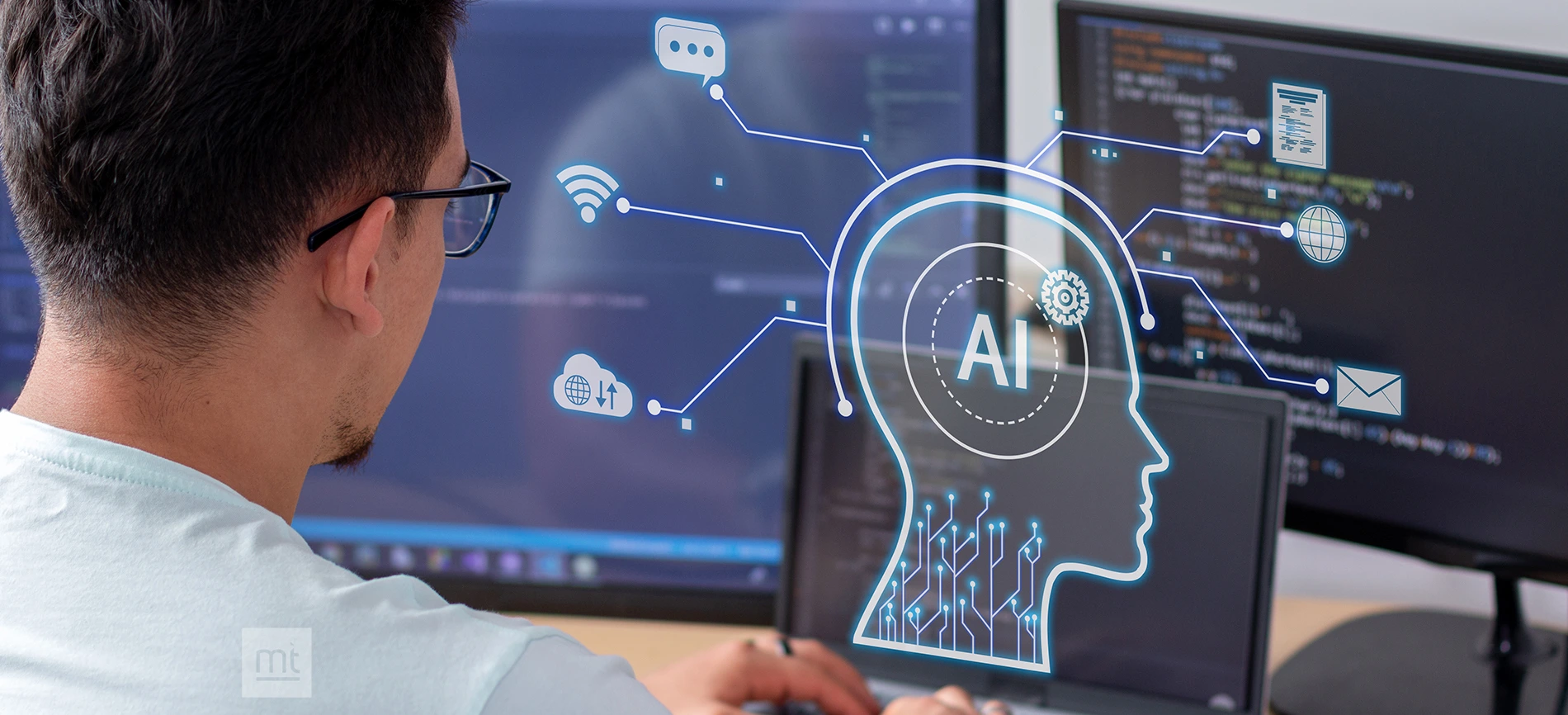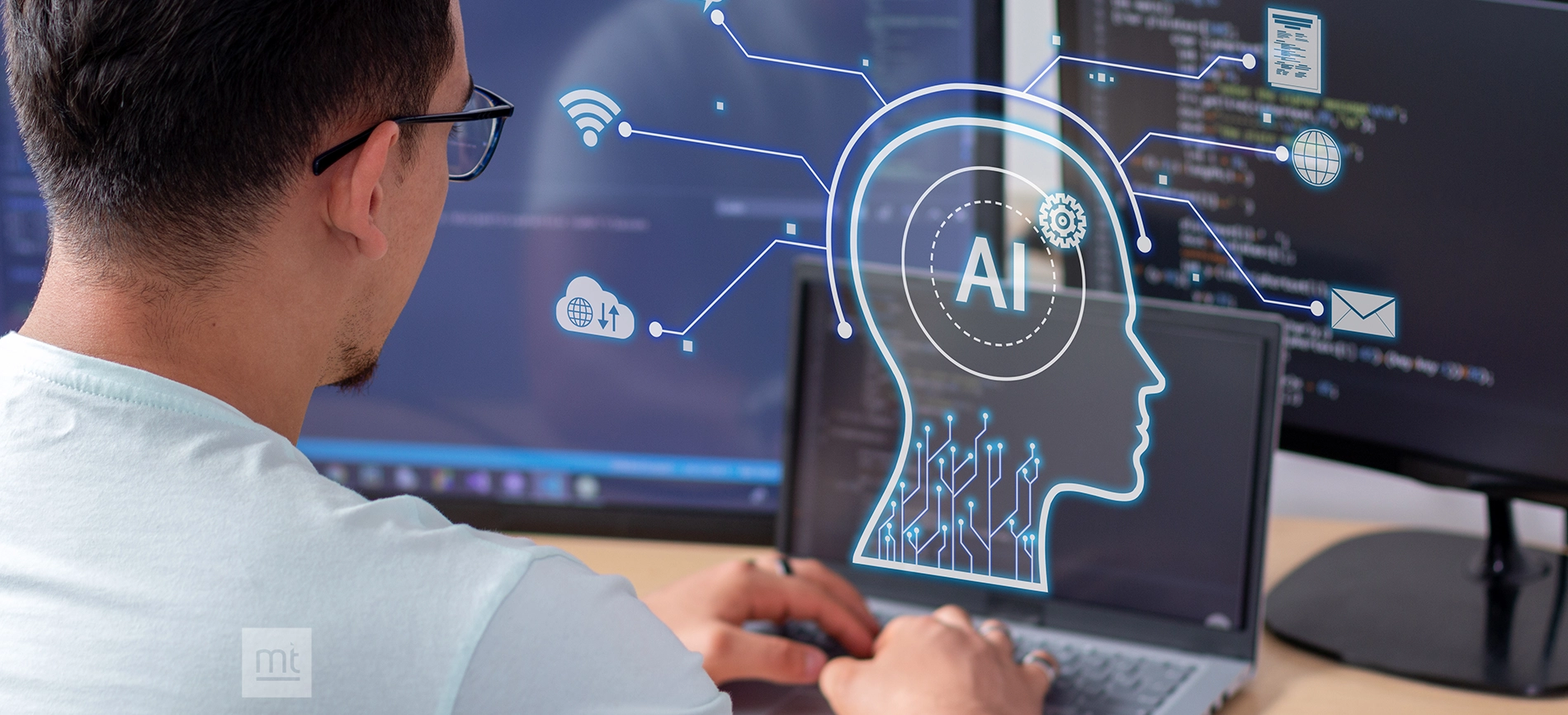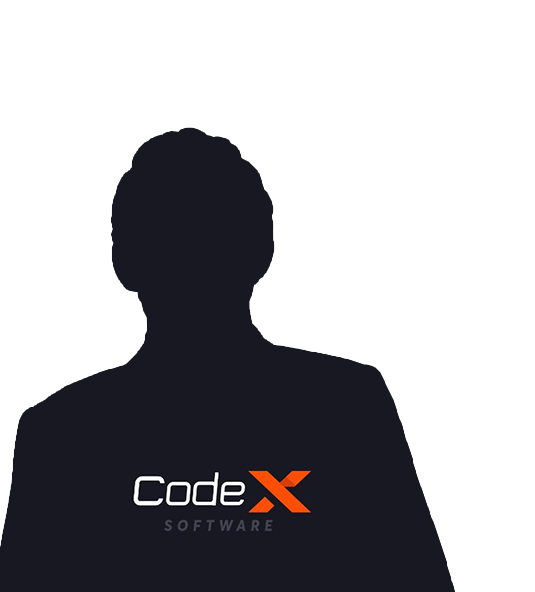Get Free Trial Week Developer Access, Try Before You Hire. Click Here to Claim Now
Introduction
We all deal with AI agents on a daily basis. Whenever we visit any website or shopping website, you might see a pop-up coming from the side. How can we help you? These are the AI agents that help users with their queries. Today, AI has become an essential part of every business for automating operations, reducing costs, simplifying complex challenges, learning user behaviors, staying updated with trends, and more. Hence, the development of AI agents is in demand.
In fact, they are the real problem solvers in today's fast digital world. 90% of companies say their work runs more smoothly with the help of generative AI agents.
Using AI is powerful for business, but it does come with certain costs. Hence, it's important to understand the financial side. If you are planning to build an AI agent and want to learn about the Cost of AI Agent Development, this article is for you. You will also learn about the Cost of Building AI Agents, what influences the pricing, and how to make the right investment for your business.
What are the Benefits of AI Agents?
AI agents can be beneficial to businesses in many ways. Below are some of the top benefits of using AI agents.
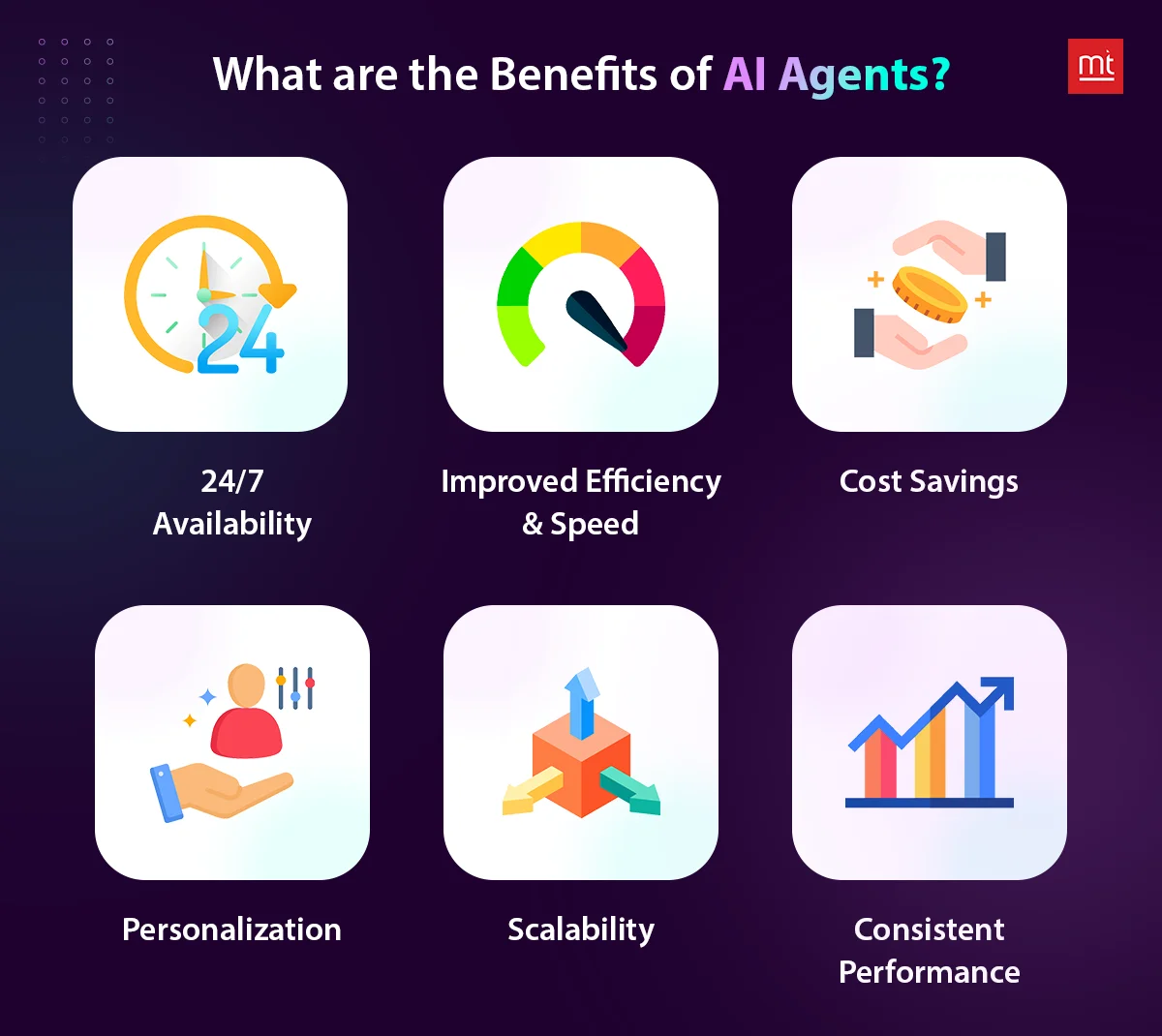
1. 24/7 Availability
The best thing you can do for your customers is stay available 24/7, and that is what AI agents do. It provides round-the-clock support to users even during holidays or off-hours. This reduces the wait time and increases customer satisfaction.
2. Improved Efficiency & Speed
AI agents can perform tasks faster and more efficiently than humans, like they can quickly analyze data, respond to queries, and execute commands in seconds. Hence, you can easily handle a large volume of enquiries and interactions from users and respond to them quickly without compromising on services.
3. Cost Savings
You don't need to hire a support team, specific experts, or purchase tools to handle business tasks. AI agents can do repetitive and lengthy tasks in seconds. It can also handle hiring, shortlisting, training, and other tasks as it's trained. Hence, this can save a lot of operational costs.
4. Personalization
It helps to provide customers with personalized solutions by learning from user behavior, preferences, and past interactions. This way, AI agents help to understand actual users' needs and provide them with the best recommendations and offers.
5. Scalability
AI agents are suitable for growing businesses because they can easily handle thousands of users and adapt to changing demands. Hence, no matter how much your business expands, AI agents can easily handle a sudden traffic rise without affecting business performance.
6. Consistent Performance
AI agents don't get tired like humans, hence you can offer consistent service with the same quality to the customers. This creates a good impression and consistency in the business.
What are the Different Types of AI Agents?
Below are the various types of AI agents that are used to fulfill many purposes in diverse industries.
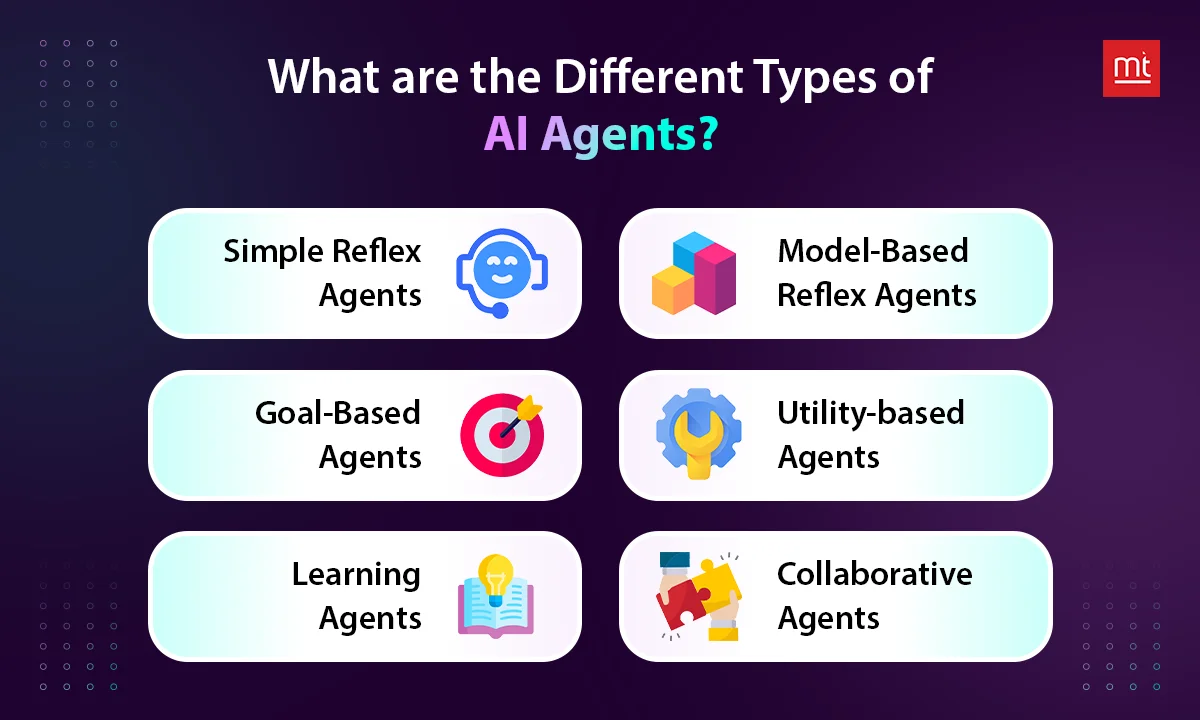
#1. Simple Reflex Agents
These are also called reactive AI agents. This works by reacting to the input provided by users or pre-programmed rules, or prompts. This is the simplest type of AI agent as it doesn't learn or analyze any past data. This just gives answers based on the questions or input provided by the customer.
Example: Simple Chatbot
#2. Model-Based Reflex Agents
Model-based reflex agents are more advanced than simple reflex agents. These use internal models to understand how the world works. They remember previous states and use that memory to make better decisions. This helps them respond to more complex or changing situations.
For example, a robot vacuum may remember where furniture is placed to clean more efficiently without repeatedly bumping into objects.
#3. Goal-based Agents
Goal-based agents focus on fulfilling specific purposes. They implement various actions and choose the one that satisfies their goal the most.
For example, GPS navigation is one of the goal-based agents where the user needs to reach a specific destination. So the GPS analyzes the multiple routes and chooses the most suitable one that is easy and quick to reach for users.
#4. Utility-based Agents
Utility-based agents are more concerned about the high-quality results along with reaching the goal. It considers factors like maximum efficiency, profitability, and user satisfaction to make useful decisions. Here, value(utility) is assigned to each result, and the agent chooses the utility that leads to the highest outcome.
#5. Learning Agents
Learning agents are constant learners. They learn from the experience to improve their behaviour and optimize decisions based on the feedback they receive. A good example is a recommendation engine that gets smarter the more you use it, offering better suggestions by learning from your clicks, purchases, or skipped content.
Like Netflix, it learns from your interests and habits when you use the Netflix platform. It learns what you search, add to your watchlist, and based on this, it recommends according to your interests.
#6. Collaborative Agents
Collaborative agents work in coordination with people and other things to reach common goals. It uses collective intelligence to solve problems, make useful decisions, and coordinate effectively.
For example,
In a smart factory, multiple AI-driven machines may coordinate tasks in real time to improve efficiency, avoid errors, and adapt to unexpected changes collaboratively.
Factors Influencing AI Agent Development Cost
Building an AI agent is an ongoing process, and it keeps little costs at every step. Below are the various factors to get an idea about the AI development cost and avoid surprises in the future.
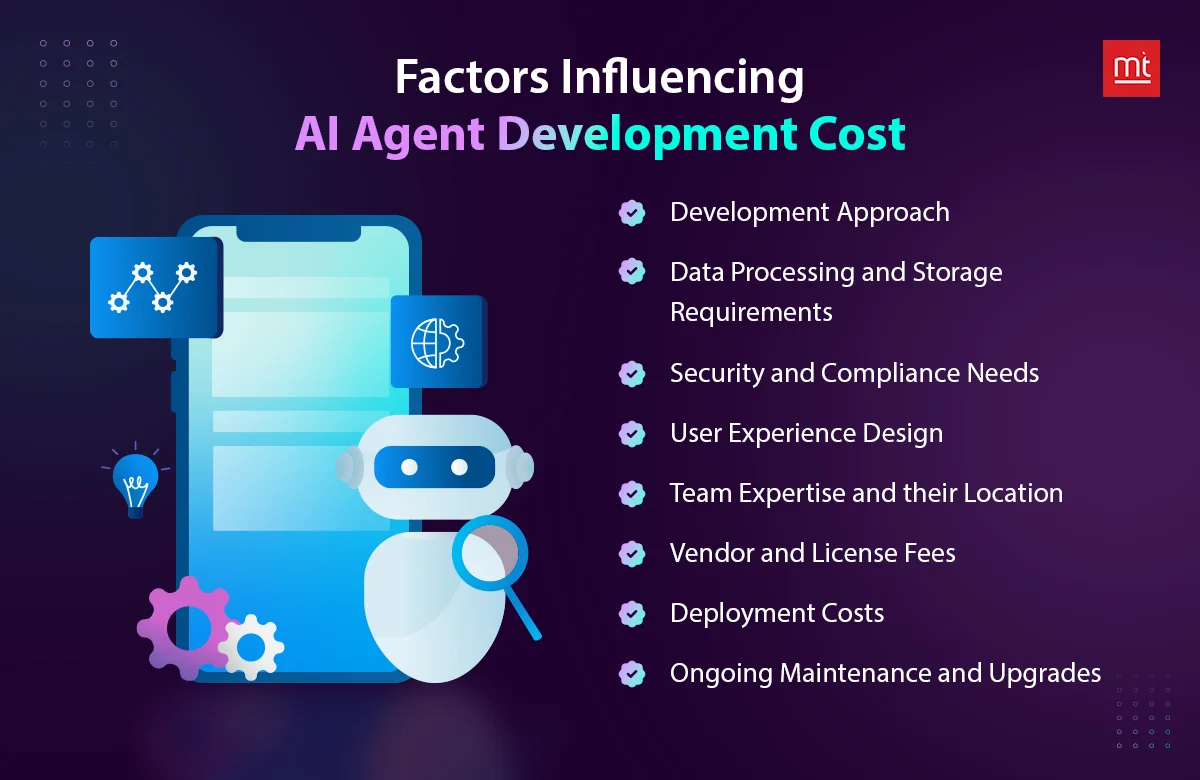
#1. Development Approach
The approach you follow to develop an AI agent will impact cost. If you are using open-source models like GPT4 or BERT, it can be completed with less cost but might limit customization. If your needs are totally custom-based, it's best to build an AI agent from scratch to scale it with your business and have full control. If your requirement includes any AWS, Google AI, or any subscription service, this can also add cost.
#2. Data Processing and Storage Requirements
AI agents will require a huge amount of data according to your business needs, and also secure storage. Hence, the volume and nature of data affect the costing.
If the data is huge and complex, it needs more storage and cleaning, and other data processing. While smaller data sets are manageable. If you use on-premises or cloud-based services, this adds extra development cost.
#3. Security and Compliance Needs
Security is a top-notch concern as users will be providing their business details and other inputs to AI agents, so it's very important to follow ethical practices and invest in data privacy regulations, even if it needs extra cost.
Spending on security software and tools will make your users feel secure and this will help in retaining clients.
#4. User Experience Design
You must spend on good UX design, as it is important to connect users and AI agents. Consider Intuitive interfaces, natural conversation flows, and personalization features for a better user experience.
Pro-tip: Take help from designers and developers for better adoption of AI agents.
#5. Team Expertise and Their Location
You need an experienced AI developer to build a highly functional AI agent for your business. The experience of the developer and its locations also affect the overall AI agent development cost.
Especially if you hire AI agent developers from Europe or America, the upfront cost will grow.
Pro tip: Always hire a seasoned developer who is experienced in building AI agents for the best outcomes.
#6. Vendor and License Fee
There are many other things more than just coding an AI agent. It also needs various third-party tools and softwares to function as an AI agent. Some tools can be free, while others may have licensing fees.
Hence, always analyze and compare various vendors, licensing fees to avoid hidden costs.
#7. Deployment Costs
Once the AI agent is built, it also has a deployment cost. This step needs infrastructure setup, hosting, testing, and integration with existing systems. This cost can depend on whether it’s deployed on-premises, in the cloud, or in hybrid environments. Plus, if you are a growing business, you should also consider future investments.
#8. Ongoing Maintenance and Upgrades
Once the AI agent is built, you will need to maintain the update to make sure it's accurate and working fine. This includes regular bug fixing and updating, retraining the AI model according to users' feedback for better results.
Consider the cost for future enhancements.
How to Reduce AI Agent Development Cost?
Below are some useful tips to save cost of AI agent development.
- Use Pre-trained Models and Open-source Tools
Instead of building and training an AI agent from scratch, you can use pre-trained models or open-source tools such as OpenAI, AWS Lex, etc, and customize them according to your business needs. This will also save time and money.
- Start with an MVP
Don't make the complete AI agent altogether. Begin with an MVP and test its core features and functionalities. If it's working great and users are responding positively then build further.
- Use Cloud-based AI services (AWS SageMaker, Google Vertex AI, etc.)
Cloud-based AI services help to reduce hardware costs and maintenance because they offer ready-to-use environments, tools, and scalable infrastructure for AI development. You can only pay for the service you want. Plus, they also come with built-in security, version control, and automation features.
- Partner with Experienced AI Development Companies
Experienced AI companies might charge more at the beginning, but it's worth it because they know the best practices, tools, and shortcuts to deliver quality solutions faster. This helps to avoid costly mistakes and rework in the future.
- Invest in Reusable Components and Frameworks
Try to build reusable components as much as you can for tasks like data processing, API calls, or user management. This will prevent duplication and speed up the AI agent development with consistency.
Why Should You Trust Manektech for AI Agent Development?
Manektech has been developing top-notch AI app development services like automation bots, simple chatbots, and more for various e-commerce and technical clients. With 14 years in the mobile app development industry, we have the experience and expertise to develop customized AI solutions to fulfill industry-specific needs. We always follow a forward-thinking approach to understand the uniqueness of every business and prioritize scalability AI solutions to cut down unnecessary costs in the future.
If you don't know how to build an AI Agent and are thinking of building one for your business, then our experts can guide you from scratch to deployment and even after post-deployment, book a free consultation today.
Final Thoughts
Hope this blog gives a brief idea of how much it costs to develop an AI Agent. Building AI agents requires more than financial planning, there are also many other concerns like clear strategic vision, cost-benefit analysis, flexibility, scalability, adaptability by users, and future maintenance. AI agents can be different according to the business target audience and the service they provide. Consider the above factors to align features, cost, and business objectives perfectly.
FAQs:
1. How Much Time does it Take to Build an AI Agent?
The time to build an AI agent depends on complexity, data available, and tools used. The simple AI agent app usually takes 1 to 3 months, while the moderate complexity AI agent app takes 3 to 6 months, and advanced or more complex ones can take more than 6 months or a year.
2. What is the Cost of AI Agent Development?
The cost of AI agent development can range from $10,000 to $150,000, depending on factors like complexity, customization, integration required, quality of data, and its availability. UX design, team expertise, hosting, maintenance, and updates.
If it's a simple chatbot, then it might cost $10,000 to $50,000. For an Advanced Virtual Assistant, it can cost $50,000 to $200,000+, and for an E-commerce AI Agent, the cost can range from $30,000 to $150,000
3. How will Making an AI Agent Benefit My Business?
AI agents benefit every small and large enterprise by improving operational efficiency. It automates tasks, improves customer service, and reduces operational costs. An AI agent helps to provide a better user experience by delivering quick, real-time responses and handling repetitive queries from customers for business.
4. Do I Need a Large Dataset to Build an AI Agent?
It depends! You don't always need a huge data set to build an AI agent. You can also use pre-built data and transfer learning. But for highly specific tasks or a customized AI agent, you might need large and clean data sets to create the functionality accordingly.
5. What’s the Difference Between Building vs Buying an AI Agent?
Building an AI agent means you build an AI agent from scratch with the desired functionality. This is customizable and scalable. While buying an AI agent is best for quick deployment and reduces initial building cost but it might not be customizable, and has data privacy concerns according to the vendors.
Recommended Blogs
Subscribe to Our Newsletter!
Join us to stay updated with our latest blog updates, marketing tips, service tips, trends, news and announcements!




